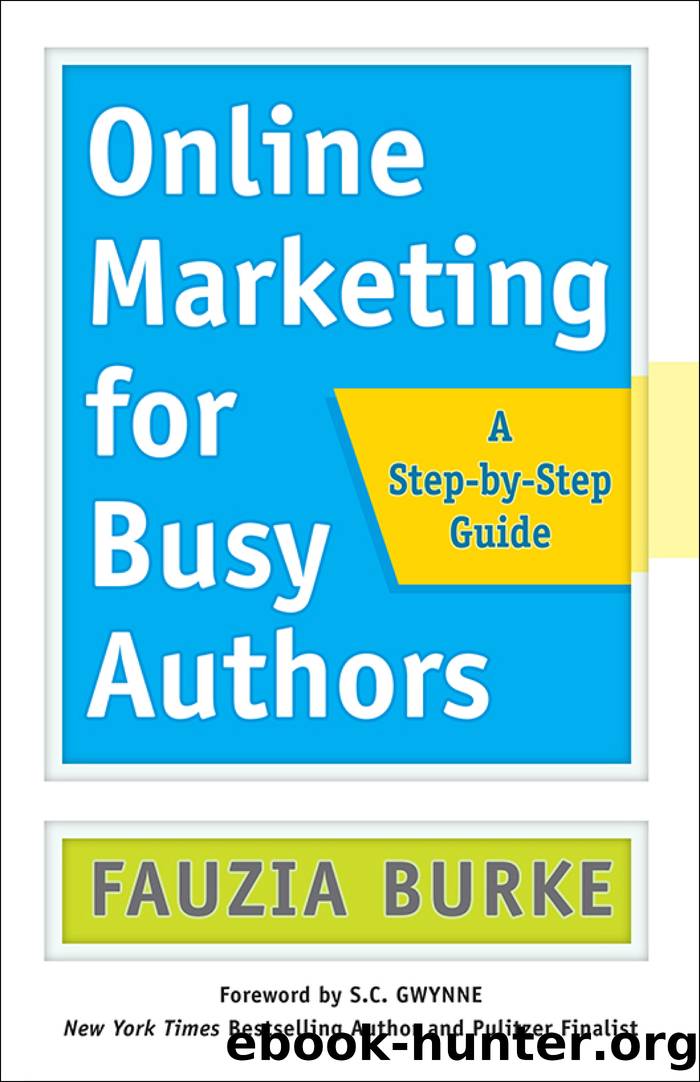Online Marketing for Busy Authors by Fauzia Burke

Author:Fauzia Burke
Language: eng
Format: epub
Publisher: Berrett-Koehler Publishers
Published: 2016-12-15T00:00:00+00:00
Blogging checklist
Writing blogs can be distracting, an unproductive time sink. ThereâIâve just listed most of the arguments against blogging. Now let me make my case. Being an author today is like being a small business owner. You need a marketing strategy or you will go out of business. If people canât find you, they canât buy your books. You have many choices when it comes to marketing, but I consider blogs (like websites) a key part of the foundation of a digital strategy.
Blogs are the absolute best way to drive traffic to your websites.
For book authors in a competitive marketplace, the need to blog couldnât be clearer. Blogs position authors as experts and thought leaders. Blogs give authors the opportunity to stay connected with their readers and build their online community. Rick Dragon, the CEO and cofounder of DragonSearch, a digital marketing agency, says, âThe best tactic weâve deployed to consistently increase traffic to websites is blogging. This isnât about writing another blog postâit means writing really valuable and relevant content.â
Blogs are a natural extension of you as a writer.
Consider the time you spend blogging as an extension of your job as a writer. Sure, the publisher will offer support and expertise, but to communicate with your readers 24/7 (which is now the expectation and the norm) you need to develop different types of content. Blogging is a great way to share your knowledge, test how your content resonates, and collaborate with others. Blogs also provide you with the opportunity to link your content to your books, ebooks, white papers, audio recordings, slide presentations, videos, and webinars, so there are lots of cross-promotional opportunities.
You can showcase your expertise and define your niche.
Every blog you write helps define your personal brand. You can position yourself as the go-to expert in your field. Developing your personal brand takes time, but as you continually contribute content in your niche, you will connect with and identify your ideal audience. You can position yourself to promote more books, as well as apps, conferences, videos, your website, and more. When you become known as an expert in a field, you also become more valuable to publishers and agents.
Keep it interesting.
One consideration here is to be flexible with the topics of your blogs. You certainly donât want to blog about things that are not related to your book topic, but you can have some flexibility. For example, I usually blog about book marketing, but last year I posted two completely unrelated blogs, one on gratitude and the other a personal one on living wholeheartedly. Believe it or not, both of those blogs bring more traffic to our site than any other. Go figure.
You can write your next book.
Yes, creating your next book is not as easy as stringing together a collection of your blogs, but itâs much easier to write a 700-word blog than it is to type out a 50,000-word book. Since big projects are more easily accomplished in small bites, view your blog writing as a laser-like focus on creating the chapters of your next book, one chapter at a time.
Download
This site does not store any files on its server. We only index and link to content provided by other sites. Please contact the content providers to delete copyright contents if any and email us, we'll remove relevant links or contents immediately.
| Authorship | Bibliographies & Indexes |
| Book Industry |
Asking the Right Questions: A Guide to Critical Thinking by M. Neil Browne & Stuart M. Keeley(5709)
Autoboyography by Christina Lauren(5206)
Eat That Frog! by Brian Tracy(4484)
Dialogue by Robert McKee(4354)
Sticky Fingers by Joe Hagan(4148)
Journeys Out of the Body by Robert Monroe(3590)
Annapurna by Maurice Herzog(3449)
Full Circle by Michael Palin(3417)
Schaum's Quick Guide to Writing Great Short Stories by Margaret Lucke(3348)
Elements of Style 2017 by Richard De A'Morelli(3325)
The Art of Dramatic Writing: Its Basis in the Creative Interpretation of Human Motives by Egri Lajos(3039)
Atlas Obscura by Joshua Foer(2933)
Why I Write by George Orwell(2915)
The Diviners by Libba Bray(2910)
In Patagonia by Bruce Chatwin(2897)
The Fight by Norman Mailer(2889)
The Mental Game of Writing: How to Overcome Obstacles, Stay Creative and Productive, and Free Your Mind for Success by James Scott Bell(2876)
Venice by Jan Morris(2548)
The Elements of Style by William Strunk and E. B. White(2454)
